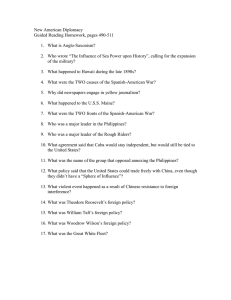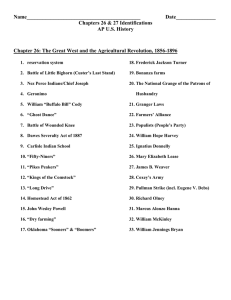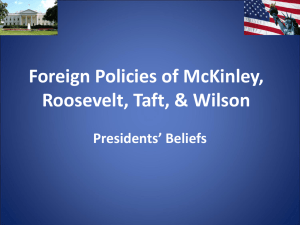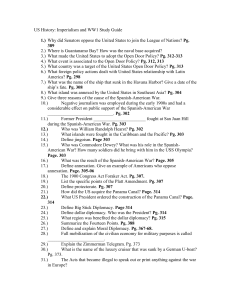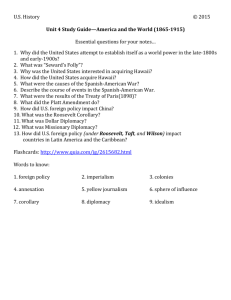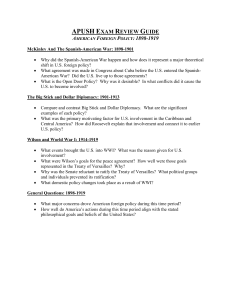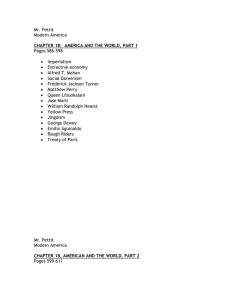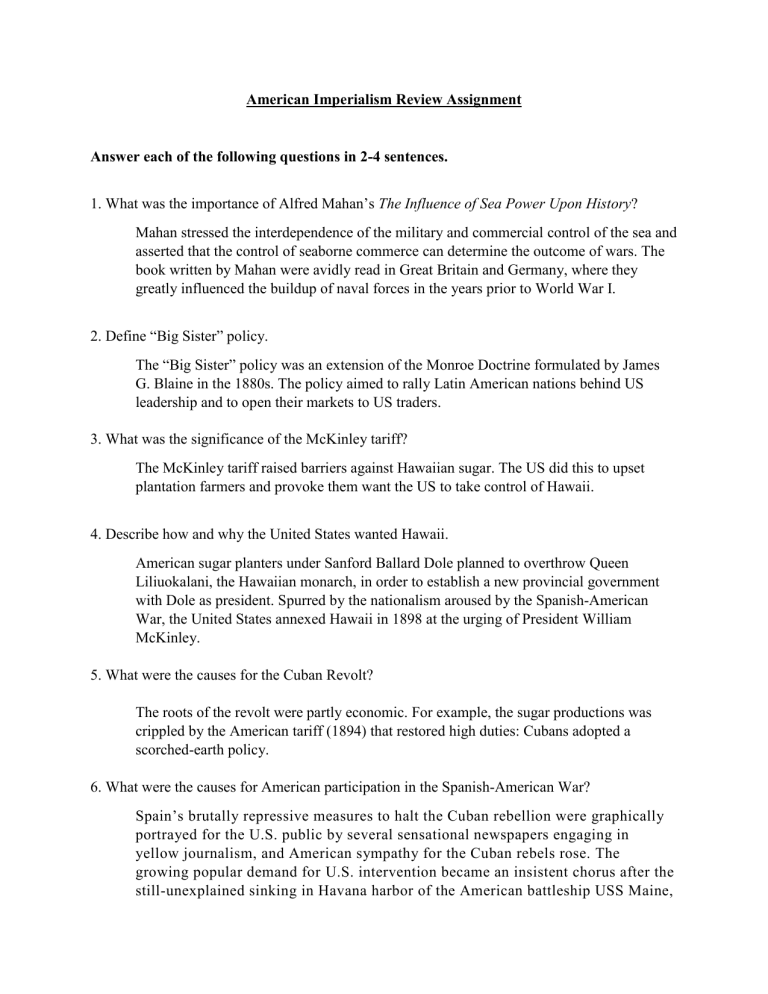
American Imperialism Review Assignment Answer each of the following questions in 2-4 sentences. 1. What was the importance of Alfred Mahan’s The Influence of Sea Power Upon History? Mahan stressed the interdependence of the military and commercial control of the sea and asserted that the control of seaborne commerce can determine the outcome of wars. The book written by Mahan were avidly read in Great Britain and Germany, where they greatly influenced the buildup of naval forces in the years prior to World War I. 2. Define “Big Sister” policy. The “Big Sister” policy was an extension of the Monroe Doctrine formulated by James G. Blaine in the 1880s. The policy aimed to rally Latin American nations behind US leadership and to open their markets to US traders. 3. What was the significance of the McKinley tariff? The McKinley tariff raised barriers against Hawaiian sugar. The US did this to upset plantation farmers and provoke them want the US to take control of Hawaii. 4. Describe how and why the United States wanted Hawaii. American sugar planters under Sanford Ballard Dole planned to overthrow Queen Liliuokalani, the Hawaiian monarch, in order to establish a new provincial government with Dole as president. Spurred by the nationalism aroused by the Spanish-American War, the United States annexed Hawaii in 1898 at the urging of President William McKinley. 5. What were the causes for the Cuban Revolt? The roots of the revolt were partly economic. For example, the sugar productions was crippled by the American tariff (1894) that restored high duties: Cubans adopted a scorched-earth policy. 6. What were the causes for American participation in the Spanish-American War? Spain’s brutally repressive measures to halt the Cuban rebellion were graphically portrayed for the U.S. public by several sensational newspapers engaging in yellow journalism, and American sympathy for the Cuban rebels rose. The growing popular demand for U.S. intervention became an insistent chorus after the still-unexplained sinking in Havana harbor of the American battleship USS Maine, which had been sent to protect U.S. citizens and property after anti -Spanish rioting in Havana. American sympathy for the Cuban rebels rose. The growing popular demand for U.S. intervention became an insistent chorus after the still -unexplained sinking in Havana harbor of the American battleship USS Maine, which had been sent to protect U.S. citizens and property after anti-Spanish rioting in Havana. 7. Define the Teller and Platt Amendments. Which one came first? Teller Amendment: asserted that the United States disclaims any disposition of intention to exercise sovereignty, jurisdiction, or control over said island except for pacification thereof, and asserts its determination, when that is accomplished, to leave the government and control of the island to its people. Platt Amendment: a treaty between the U.S. and Cuba that attempted to protect Cuba's independence from foreign intervention. It permitted extensive U.S. involvement in Cuban international and domestic affairs for the enforcement of Cuban independence. The Teller Amendment came first. 8. Who were the Rough Riders? Rough Riders, the first voluntary cavalry in the Spanish-American War. They participated in the capture of Kettle Hill, and then charged across a valley to assist in the seizure of San Juan Ridge, the highest point of which is San Juan Hill. 9. Why did the United States fight in the Philippines during the Spanish-American War? The United States’ drive to extend influence across the Pacific instigated a PhilippineAmerican War during the Spanish-American War. Fighting broke out on Feb. 4, 1899, and eventually far exceeded that against Spain. 10. What were the provisions of the Treaty of Paris of 1898? The United States received the Philippines and the islands of Guam and Puerto Rico. Cuba became independent, and Spain was awarded $20 million dollars for its losses. The treaty prompted a heated debate in the United States. 11. What were the arguments for and against American imperialism? There were three major arguments in the United States for imperialism. First, it was a way for the United States to strengthen its economy. Second, it was a way to increase the country's military power. Finally, it was a way of fulfilling the country's duty to help civilize the rest of the world. On the contrary, the anti-imperialists opposed the expansion because they believed imperialism violated the credo of republicanism, especially the need for "consent of the governed". 12. What was the Foraker Act? The Foraker Act was enacted in 1900 following the Spanish-American War. The United States federal law that established civilian government on the island of Puerto Rico, which had recently become a possession of the United States as a result of the Spanish– American War. 13. What were the Insular cases? The insular cases are Supreme Court cases which dealt with the legal status of territories acquired by the United States after the Spanish-American War. The Supreme Court held that full constitutional rights do not automatically extend to all places under American control. The Court also established the doctrine of territorial incorporation, under which the Constitution applied fully only in incorporated territories. 14. What was William Taft’s role in the Philippines? Taft resigned his judgeship on March 15, 1900, to accept appointment by Pres. William McKinley to serve as chairman of the Second Philippine Commission. Charged with organizing civil government in the islands following the Spanish-American War (1898), Taft displayed considerable talent as an executive and administrator. In 1901 he became the first civilian governor of the Philippines, concentrating in that post on the economic development of the islands. 15. What was the Open-Door policy? How was this a cause of the Boxer Rebellion? The Open Door Policy was a trade agreement between the United States, China, Japan, and several European countries allowing equal trade access to China, a country that previously had no trade agreements. The creation of the Open Door Policy increased foreign influence in China, which led to a rise in anti-foreign and anti-colonial sentiment in the country. The backlash against foreigners led to widespread killings of missionaries working in China and an increase in nationalist feelings among the Chinese. The Boxer Rebellion was one of the most important events caused by this anti-foreign movement. The Boxer Rebellion started in 1899, when a Chinese group known as the Society of Righteous and Harmonious Fists (known as “Boxers” to the English) initiated an uprising against foreign influence. The US, Japan, and several European countries fought back and eventually defeated the Boxers in 1901. Even after the rebellion ended, foreign soldiers continued killing and looting in many villages. 16. Who ran for president in 1900? Who won? The 1900 United States presidential election was the 29th quadrennial presidential election, held on Tuesday, November 6, 1900. In a re-match of the 1896 race, Republican President William McKinley defeated his Democratic challenger, William Jennings Bryan. 17. Who became president when the winner of the election of 1900 was assassinated? With the assassination of President William McKinley, Theodore Roosevelt, not quite 43, became youngest President in the Nation's history (1901-1909). He is the 26th president of the United States. 18. Why did the U.S. want to build the Panama Canal? How were they able to build it? Americans knew they needed this to move ships from east to west quickly. If they did that, they would control power because they would control the oceans. The Canal was a geopolitical strategy to make the United States the most powerful nation on earth. Also, the economic impact was massive. The project was helped by the elimination of disease-carrying mosquitoes, while chief engineer John Stevens devised innovative techniques and spurred the crucial redesign from a sea -level to a lock canal. His successor, Lt. Col. George Washington Goethals, stepped up excavation efforts of a stubborn mountain range and oversaw the building of the dams and locks. 19. Define the Roosevelt Corollary. The Roosevelt Corollary was an addition to the Monroe Doctrine articulated by President Theodore Roosevelt in his State of the Union address in 1904 after the Venezuela Crisis of 1902–1903. The Corollary stated that the United States would intervene as a last resort to ensure that other nations in the Western Hemisphere fulfilled their obligations to international creditors, and did not violate the rights of the United States or invite foreign aggression to the detriment of the entire body of American nations. 20. Explain the following foreign policy ideologies: Big Stick Diplomacy, Dollar Diplomacy, and Moral Diplomacy. Be sure the identify which president was the architect of each policy. Big Stick diplomacy is the policy of carefully mediated negotiation ("speaking softly") supported by the unspoken threat of a powerful military ("big stick"). President Theodore Roosevelt was the architect of the policy. President William Howard Taft and Secretary of State Philander C. Knox followed a foreign policy characterized as “dollar diplomacy.” The policy ensured the financial stability of a region while protecting and extending U.S. commercial and financial interests there. Moral Diplomacy is a form of Diplomacy proposed by US President Woodrow Wilson in his 1912 election. Moral Diplomacy is the system in which support is given only to countries whose moral beliefs are analogous to that of the nation.
